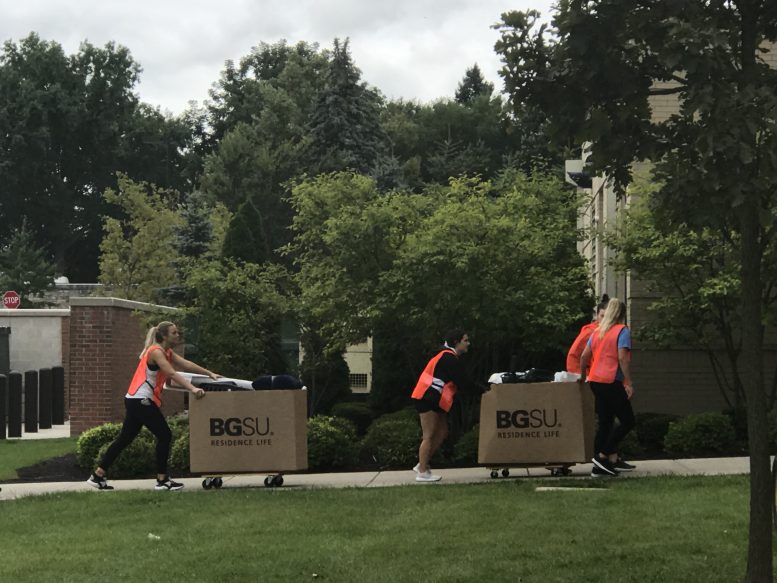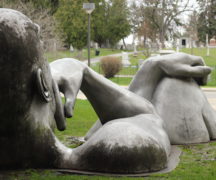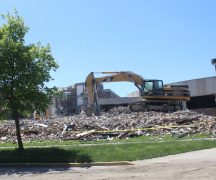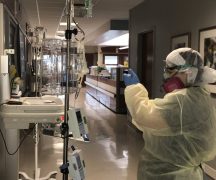By DAVID DUPONT
BG Independent News
Bowling Green State University is paying students not to live on campus in fall.
On Thursday the university sent out an offer to residential students that it hopes 2,000 of them will find too good to refuse – $1,500 if they forego living on campus.
The payments are being funded by federal CARES money the university received.
Alex Solis, spokesperson for BGSU, said that the plan developed as administration worked to prepare campus for the arrival of students later this month. Classes start Aug. 26.
In consultation with Ben Batey, BGSU’s new chief health officer, they decided they needed to “de-densify” the residence halls. Ideally that means cutting occupancy by 50 percent, Solis said. Every residential student would have a single room. Rooms in suites are considered single rooms Already 700-800 students have said they will not be staying on campus.
If 2000 students accept the $1500 offer that will achieve that goal. Otherwise, the university will make adjustments as needed.
In his message to students, President Rodney Rogers wrote: “With a goal to work toward mostly single occupancy in our residence halls and with options for students to complete their coursework remotely or fully online, we are asking students who were planning to live on campus to consider alternate living and learning arrangements. If you are a student who could commute from your permanent residence during fall semester, or if you are willing to convert your schedule to online or remote learning or you could identify alternative living arrangements off campus, we are asking that you consider not living on campus for this fall.” (See full statement below)
The university will also reduce the room rate for students who had already signed up for single rooms.
While the university will try to keep as many students as possible in the residence halls they’d originally chosen, some may be moved.
Solis said about 300 students have already filed for the payments as of 6 a.m. Friday morning.
Solis said enrollment for fall “is still healthy.” The administration continues to watch those numbers closely.
The university will also work with students who want to take a gap year or defer enrollment.
A debate is raging nationwide about whether institutions of higher education will offer face-to-face instruction in some form or teach online only. Some schools are reversing earlier decisions about having some form of face to face instruction, and going online only.
Solis said BGSU was giving students a choice. “We don’t want to be the university that makes decision for them.”
The letter from Rogers spells out some of those measures:“(w)earing face coverings and self-monitoring of your health each morning will be required, classrooms have been de-densified and physically distanced, the size of social group meetings will be limited, guests will not be allowed in your residence hall room, and testing and contact tracing will be necessary.”
Students will be required to sign a Community Commitment.
“While our actions will make a difference, we also recognize that it is unlikely we will be immune to the virus on our campuses,” Rogers said.
Faculty member Andrew Schocket, a professor of history, questions whether that is worth the risk.
He stated early Friday: “BGSU leadership made a $3 million bet yesterday on forging ahead with opening campus. There are at least fifteen rigorous COVID-19 models; the most optimistic of them projects the nation’s daily death toll during the first week of the semester in the hundreds, while some put that number in the thousands. If BGSU opens, students will come from all over, including hot spots. President Rogers has a public responsibility to explain why these models do not apply to BGSU, or, if they do, why BGSU is willing to put students, staff, faculty, and members of the wider BG community in mortal danger.”
In response, Solis, issued the following statement: “While we appreciate the fifteen rigorous models that were shared earlier this morning from a faculty member, we have not had a chance to study them in-depth. However, here is what we know: we will continue to work in concert with the Ohio Department of Health and the Centers for Disease Control and Prevention, focusing on their recommendations and orders to resume in-person learning this fall. Models are informative projections, but we also know that human behavior such as wearing face coverings, physical distancing, washing hands and monitoring personal health makes a difference to successfully slow the spread of COVID-19. We continue to work on de-densifying our campuses and to have a modified in-person experience for those students who choose to be on-campus.”
Statement from President Rodney Rogers:
While we continue to learn more and focus on a return to in-person learning this fall, we remain appreciative of how our students, faculty and staff have been adaptable and flexible.
We remain committed to providing choices to our students and to de-densify our learning spaces. Every day, we learn more about this virus and track the trends and health data for our region. The Ohio Department of Health continues to see an increase in community-wide spread. Because you are one of the students who plans to live on campus, we wanted to let you know that we are working to find ways to more proactively de-densify our residence halls.
Our fall semester together will look and feel differently, and we want you to have a realistic expectation of your return this fall to BGSU. For example, wearing face coverings and self-monitoring of your health each morning will be required, classrooms have been de-densified and physically distanced, the size of social group meetings will be limited, guests will not be allowed in your residence hall room, and testing and contact tracing will be necessary. While your physical interactions will be distanced, we will also lean heavily on creative and virtual engagement.
With the input from students, faculty and staff, we have crafted the Community Commitment, for those who will be on campus, which provides shared expectations. We are requiring each member of the University to sign onto that plan to be on campus during the fall term. Please review and complete this commitment to fully understand how this fall term will be different than any other.
While our actions will make a difference, we also recognize that it is unlikely we will be immune to the virus on our campuses. We are instituting proactive quarantine and isolation practices. Based on the date of contact with any COVID-19 positive individual, you and your roommate, if you have one, may have to quarantine together for up to 14 days in your residence hall room or return to your permanent residence. If you test positive for COVID-19, you will move to designated isolation apartments. Academic accommodations will be made, and meals will be delivered to students in isolation.
With a goal to work toward mostly single occupancy in our residence halls and with options for students to complete their coursework remotely or fully online, we are asking students who were planning to live on campus to consider alternate living and learning arrangements. If you are a student who could commute from your permanent residence during fall semester, or if you are willing to convert your schedule to online or remote learning or you could identify alternative living arrangements off campus, we are asking that you consider not living on campus for this fall.
If you are willing to make alternate living plans, please complete the Office of Residence Life’s current appeal form by 12 p.m. EDT Monday, Aug. 10. We also want to share that students who wish to live on campus may see their room assignments change to accommodate a goal of mostly single-occupancy rooms. These changes will be made by Thursday, Aug. 13, 2020. If you have signed up for a double room, there will be no change to your room rate even though you may have a single occupancy room assignment. To be fair and equitable, if you initially signed up for a single room, we will decrease your room rate after the occupancy changes have been made.
We understand that this is a huge inconvenience and disruption to your plans at a late date and recognize the limitations in off-campus housing in Bowling Green. In response, we are offering a $1,500 emergency relocation payment to the first 2,000 students to forego their housing assignment this semester.
In addition, to those who have already chosen to withdraw from their housing assignment this semester, there is funding available for emergency financial assistance if you have been negatively impacted by this global pandemic. A form will be available soon on the Office of the Bursar website to qualify for a $1,500 emergency assistance.
If needed, we encourage you to work with our Design My BGSU advising team and rearrange your schedule to be fully remote or online while continuing progress toward your degree. Our goal is to be student-centered and provide you the ability to make the choice that is best for you.
Recognizing these are significant changes, we will also offer students the opportunity to defer their admission or status at BGSU.
Please know that these are very difficult decisions to make. We are very focused on being as accommodating as possible while also working to do what we believe is best to protect the health and safety of our students, faculty and staff. We will get on the other side of this crisis, and this global pandemic is not forever. However, these next 13 weeks and into the spring semester will require not just self-responsibility to slow the spread of COVID-19, but also a collective response to protect ourselves and one another.
As a public university for the public good, it’s on us to work together, prioritizing health and safety. We are counting on you to be focused and diligent. Higher education is not just a public good, but an essential good. It is not lost on us that these are difficult situations you are in, and we deeply regret we have to make these decisions; however, we are asking you to be thoughtful and intentional about these decisions, reflect about what this fall means for you and help us safely begin this next semester.





